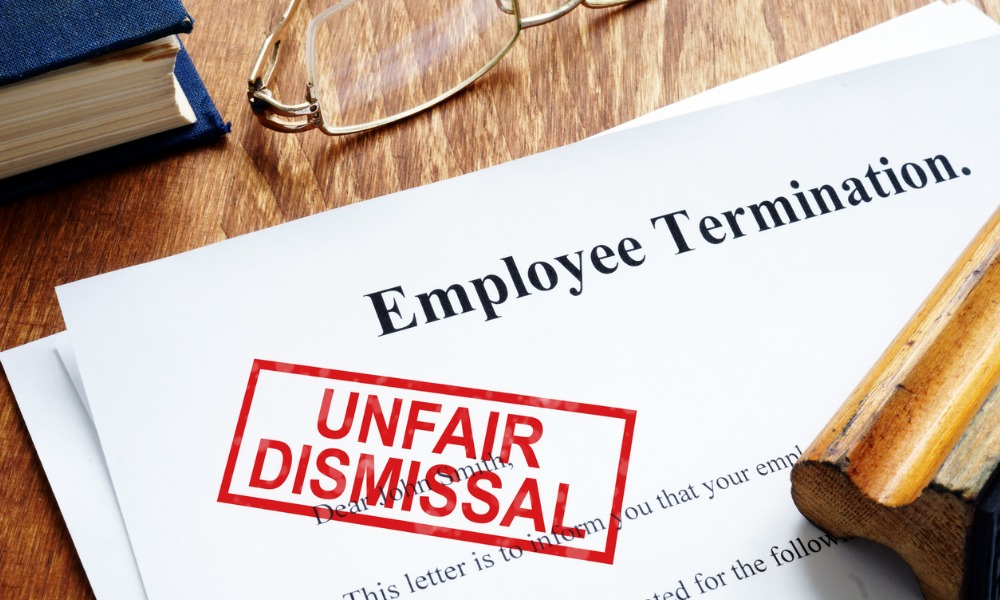
Worker argues he was 'pushed back to work' without proper fitness check

The Fair Work Commission (FWC) recently dealt with an unfair dismissal application filed by a worker who was summarily dismissed for serious misconduct on 21 December 2023.
In this case, the worker argued that his dismissal was unfair, while the employer maintained that the termination was justified due to the worker's serious misconduct.
The FWC was tasked with determining whether the dismissal was harsh, unjust, or unreasonable, taking into account various factors outlined in the Fair Work Act 2009.
The worker, who started work on 23 June 2021 as a fire technician and later started an adult sprinkler fitter apprenticeship, filed the application on 2 January 2024.
He was based in the Northern Territory and had been performing work on a Darwin Youth Justice Centre project. He relied on various pieces of evidence to support his unfair dismissal application, including his application form, emails, screenshots of Facebook messages, phone records, and WhatsApp messages.
The worker also provided reference letters from his former colleagues and managers, speaking highly of his work performance and character. One of the reference letters, from a site supervisor for Haikos Constructions, spoke highly of the worker's work on the Darwin Youth Justice Centre project.
The employer presented evidence to justify the worker's dismissal, including the employer's response form, a submission with attached evidence, and statements from the managing director and other employees.
The managing director's statement contained evidence about the employer's operations and various concerns with the worker. The evidence highlighted issues such as the worker using a work vehicle for personal travel without authorisation, concealing a tool, and sending an abusive text message to his supervisor.
During the determinative conference, the worker admitted to making highly offensive and threatening statements about the owner of the company after he was dismissed.
The employer referred to this admission several times during the conference, but the FWC clarified that this conduct could not be relied upon in relation to a valid reason for dismissal because it occurred after the dismissal took effect.
The worker's termination letter, dated 21 December 2023, outlined several instances of alleged serious misconduct, including using a work vehicle for personal travel without authorisation, failing to maintain the vehicle in a suitable condition, concealing a roll groover attachment tool, concerns about the worker's presentation and actions on his work site, sending an abusive text message to his supervisor, and unreasonable lengthy absences from work without reasonable grounds.
The worker admitted to driving the work vehicle and performing work in early December 2023 while he was "mentally ill" and "wasn't ready." He stated, "I was not the same person at this time."
The worker argued that he was "pushed back to work" because the employer indicated it would take possession of his work vehicle if his prolonged absence continued.
The FWC found that there was a valid reason for the worker's dismissal, but not for the precise reasons identified by the employer in the termination letter.
The FWC determined that the worker committed a serious breach of his statutory and contractual obligations concerning safety at work when he drove to the worksite and performed work while unfit due to serious mental health issues.
The FWC did not find the other reasons outlined in the termination letter to be valid reasons for dismissal.
For example, regarding the worker's use of the work vehicle for personal travel, the FWC stated:
"I do not consider [the employer] established that [the worker] was not permitted to use his work vehicle for any private travel. Although [his] letter of offer states 'fuel cards for business use only', that hypothetically would not prevent [the worker] paying for fuel from his own money and driving the work vehicle for personal use. In any event, the evidence suggests [he] had been using the work vehicle for some personal travel without issue since 2021 and that [the employer] must have been aware of this."
The FWC also found that the worker's absences were not a valid reason for dismissal, although it accepted that the worker failed to provide sufficient medical evidence to explain all of his absences.
The FWC considered that the worker should have been absent from work at all relevant times before his dismissal because he was unfit to work due to a serious mental illness.
Consequently, the FWC found that the worker was not unfairly dismissed. However, the employer was ordered to pay his accrued leave entitlements.
The case highlighted the importance of considering an employee's fitness for work and the potential safety risks associated with an employee performing their duties while experiencing serious mental health issues.